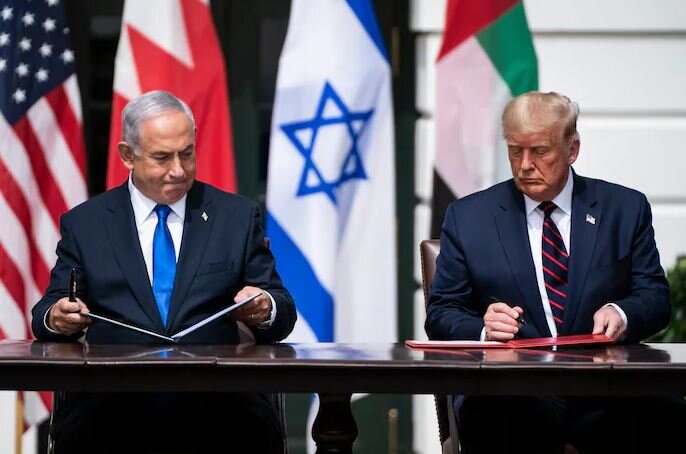Theatrical performance or genuine divide? U.S.-Israel approach in West Asia

TEHRAN – The U.S.-Israel relationship has long been a pillar of American foreign policy in West Asia, influencing security dynamics and shaping economic alliances. While their military and economic partnership remains robust, recent events—particularly the Israeli war on Gaza and Iran’s peaceful nuclear program—have reignited questions about the true nature of their ties.
Media reports suggest growing tensions between Donald Trump and Benjamin Netanyahu, including a now-deleted report by the Wall Street Journal, which claimed Netanyahu fears being “boxed” by Trump in the Iran talks, but is this rift real or a calculated diplomatic maneuver?
Trump vs. Netanyahu
Recent phone calls between the two have fueled speculation about their conflicting approaches to Iran. Trump says he advocates for diplomacy and publicly announced that he has warned Netanyahu not to disrupt nuclear negotiations with Tehran. However, Netanyahu continues to push for military action, reinforcing Israel’s hardline stance on the Iranian nuclear program.
Despite these apparent differences, history suggests that Washington and Tel Aviv routinely choreograph their disagreements—a strategy designed to keep Iran under pressure while maintaining diplomatic flexibility. Historical Patterns show that Israel’s Threats against Iran have a leveraging nature rather than a true course of action. Netanyahu’s War Bluffs against Iran have been ongoing since the day he became the Israeli Prime Minister. Former Israeli Minister Ehud Barak admitted that Israel came close to striking Iran three times between 2010 and 2012, only to abandon the plan each time. These threats, rather than signaling genuine intent for war, seemed to serve as pressure tactics, urging the U.S. and its allies to tighten sanctions on Tehran. In 2012, Israel again hinted at a preemptive strike, yet the Obama administration leveraged the threat to secure global backing for economic sanctions. This pattern suggests that Israel’s military rhetoric functions as a negotiating tool, rather than a real precursor to war.
The "Good Cop, Bad Cop" strategy has long shaped Washington and Tel Aviv’s approach to Iran, ensuring diplomatic engagement remains viable while maintaining pressure on Tehran. Now the U.S. continues to position itself as a diplomatic mediator, preserving negotiation credibility by advocating for sanctions relief and diplomatic outreach. Meanwhile, Israel sustains military threats, keeping Iran on edge through targeted rhetoric, covert operations, and periodic escalations.
Security and economic ties: A partnership beyond rhetoric
Despite public theatrics, U.S.-Israel military and economic cooperation remains unchanged. Washington provides billions of dollars annually in military aid to Israel, ensuring it maintains its so-called Qualitative Military Edge (QME) in the region. This funding supports advanced defense technologies, weapons procurement, and military training. Missile defense cooperation between the U.S. and Israel remains a cornerstone of their security partnership, with joint initiatives focusing on systems such as Iron Dome, David’s Sling, and Arrow. These technologies play a crucial role in intercepting rockets and ballistic missiles.
The U.S.-Israel Free Trade Agreement (FTA) facilitates a large amount of annual trade, fostering economic ties across multiple industries. This partnership extends beyond traditional defense contracts, increasingly encompassing AI-driven military technologies and energy exports.
Post-Gaza War fallout: Diplomatic criticism without consequences
Following Israel’s war on Gaza, Western allies have voiced concerns about Tel Aviv’s military actions, yet tangible policy shifts remain limited. Germany, the UK, and the U.S. have each issued formal condemnations, signaling diplomatic discontent over civilian casualties and the scale of Israeli offensives. However, while some countries have initiated temporary sanctions and trade reviews, core military aid flows remain unaffected, highlighting the enduring nature of Israel’s security ties with Western nations.
Despite heightened scrutiny, these criticisms appear largely symbolic, lacking substantive measures that would alter the trajectory of U.S.-Israel defense cooperation or economic partnerships. Western nations, including the U.S., are increasingly caught in a delicate balancing act as they attempt to maintain their longstanding alliance with Israel while addressing growing Arab concerns over the war in Gaza. This diplomatic tightrope is shaped by strategic economic interests, public opinion, and regional stability, forcing Western policymakers to keep their strong ties with Israel without alienating key Arab partners.
Saudi Arabia’s pause on normalization talks with Israel has signaled that Tel Aviv’s actions in Gaza could jeopardize broader regional alliances. The UAE and Bahrain, both signatories of the Abraham Accords, face domestic pressure to reassess their ties with Israel, complicating Western efforts to expand normalization agreements. Arab-led advocacy has meanwhile intensified Western public scrutiny, fueling protests across Europe and North America and increasing pressure on governments to reassess their unconditional support for Israel.
The future of U.S.-Israel relations may depend on how effectively Washington navigates these competing interests, ensuring that its alliance with Tel Aviv remains intact without alienating key Arab partners. While Western criticism of Israel has intensified and Trump first visited Arab nations, not Israel, substantive policy shifts remain unlikely, as strategic interests continue to override temporary economic benefits. However, the influence of Arab states can still direct Western narratives in a way that challenges Israel’s long-term ties with the West.
Leave a Comment